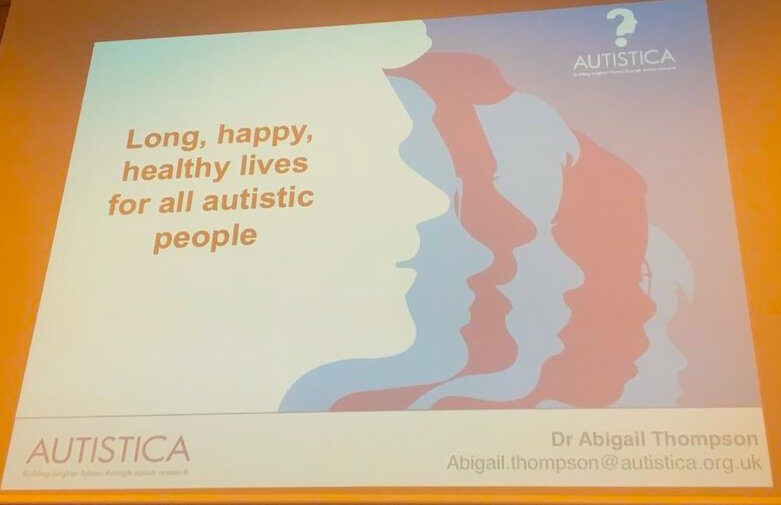Shannon Des Roches Rosa Senior Editor, TPGA [Content note: This article discusses suicidality and ableism] The 2019 International Meeting for Autism Research in Montreal begins today, so let’s discuss how autism conferences can best help the autistic people without whom autism conferences would not exist—based on how past autism conferences have gone, what can improve, and why participatory research (involving autistic people themselves) needs to be prioritized. Last year’s INSAR 2018 conference gave me some hope for the future of autism research. I’d never before seen anything like the slide below at any INSAR conference, not since I first started attending INSAR in 2011 (when it was still “IMFAR”). This Autistica slide, with the the motto of “Long, happy, healthy lives for all autistic people” encapsulates everything I want from INSAR presenters, and autism research: Photo: Sara Luterman [image: Projected slide showing a group of human faces in profile, facing…
Tag: INSAR 2018
Lily Levy at INSAR 2018 [image: Lily Levy, a white British woman, presenting a poster at an autism conference.] INSAR 2019, the International Meeting For Autism Research, starts in three days. Before we begin our coverage, we’d like to emphasize research and themes from last year’s conference INSAR 2018, in Rotterdam—so we can proceed with a grounded sense of how the two conference’s priorities compare and contrast, especially in terms of research that affects autistic people’s quality of life (QoL). A consistent QoL theme of INSAR 2018 was autistic camouflaging, also known as “masking” or “passing.” We spoke with Lily Levy, who led the INSAR 2018 presentation For Better or for Worse? Social Camouflaging, Mental Health and Wellbeing in Autistic Adults. Content note: Discussion of suidicality, bullying, and trauma. Shannon Rosa of TPGA: I’m at INSAR 2018 with Lily Levy, whose group presented the poster on Social Camouflaging, Mental Health and Wellbeing…
Sarah Cassidy’s INSAR 2018 SIG on autism and suicidality brought ~60 autistic people and autism researchers and professionals to discuss research on, and factors underlying and mitigating, suicidality in autistic people—as well as next steps for researchers. The statements and images below are from our original Twitter Moment compilation/report on this SIG. We then heard back that Twitter feeds can be difficult to parse and access for some, so we’ve created this version as well, edited for readability. Uncredited statements are from the Thinking Person’s Guide to Autism Twitter feed. —- Jon Spiers: Morning session on suicide and autism starting now at INSAR 2018 – a top priority for Autistica and Mental Health in Autism. At INSAR 2014, Sarah Cassidy was the only poster on suicidality. Now there is an entire INSAR 2018 track on autism, suicidality, and bullying. At IMFAR (INSAR) 2016, the SIG goal was to identify priority topic areas.…
Some of the onsite #AutINSAR participants, left to right: Jon Adams, Sara Luterman, Donna Bish, Andrew Colombo-Dougovito, Lily Levy, Laura Crane, Mel Bovis, Carol Greenburg, Georgina Perez Liz, and Shannon Rosa. Not pictured: Jelle van Dijk Photo by Josie Blagrave. [Image description: Neurodiverse adults smiling and posing together] The #AutINSAR chat was an in-person and online Twitter discussion about autism research priorities, with the conversation taking place directly between autistic and/or autism researchers on May 11, 2018, at #INSAR2018, the International Society for Autism Research conference in Rotterdam, Netherlands. Many thanks to participants, and partners NOS Magazine, Autistic Self Advocacy Network, Autistic Women and Nonbinary Network, autchat, and We Are Like Your Child. We discussed the following questions: Q1: What should be the top three priorities for autism research? Q2: Which topics do #ActuallyAutistic people discuss that are missing from research conversations? Q3: What kind of technology research do you think would most improve #ActuallyAutistic…



